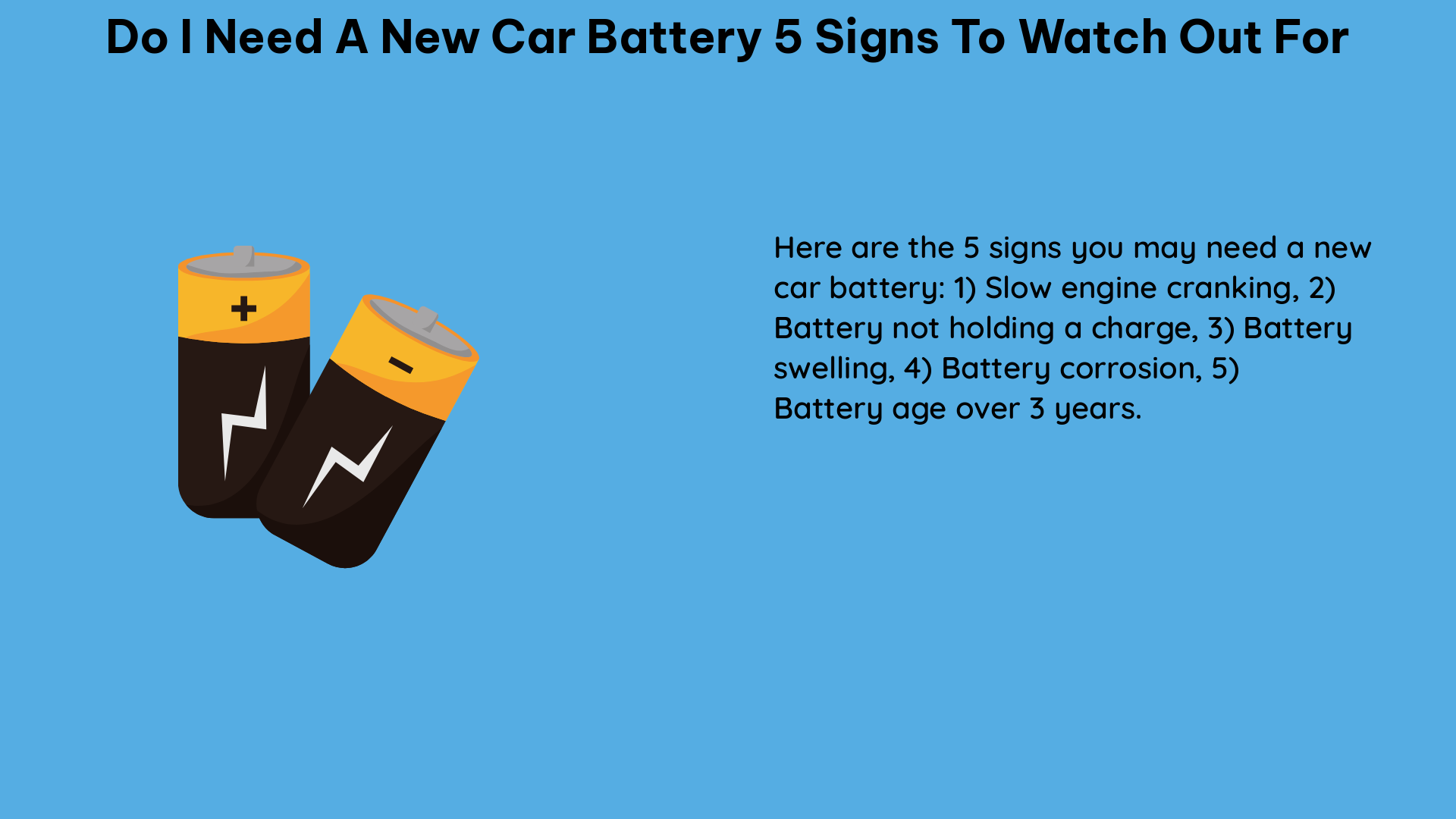When it comes to the health of your car, one of the most critical components is the battery. A well-functioning battery is essential for starting your vehicle, powering its electrical systems, and ensuring a smooth and reliable driving experience. However, like any other component, car batteries have a limited lifespan and can eventually wear out, leaving you stranded or with a malfunctioning vehicle.
To help you determine if it’s time to replace your car battery, here are 5 key signs to watch out for:
1. Slow Engine Cranking or Difficulty Starting
One of the most obvious signs that your car battery is failing is if it takes longer than usual to start your vehicle. A healthy battery should be able to crank the engine quickly and effortlessly, but as the battery ages, its ability to provide the necessary power diminishes. If you notice that your car is slow to start or requires multiple attempts to get the engine running, it’s a clear indication that the battery is struggling and may need to be replaced.
According to a study by the Automotive Maintenance and Repair Association (AMRA), a healthy car battery should have a voltage of at least 12.6 volts when the engine is off. If the voltage drops below 12.4 volts, it’s a sign that the battery is nearing the end of its lifespan and may need to be replaced soon.
2. Frequent Jump-Starts

If you find yourself needing to jump-start your car more often than usual, it’s a strong sign that your battery is failing. A healthy battery should be able to hold a charge and provide enough power to start the engine without assistance. However, as the battery ages and its capacity decreases, it may not have enough juice to start the car on its own, leading to the need for frequent jump-starts.
According to a survey conducted by AAA, the average car battery lasts between 3-5 years, with some lasting as long as 6 years. If your battery is older than this and you’re experiencing frequent jump-starts, it’s likely time to replace it.
3. Bulging or Cracked Battery Case
Another clear sign that your car battery is failing is if the case appears to be bulging or cracked. This can be caused by a variety of factors, including overcharging, extreme temperatures, or simply the natural aging process of the battery. A bulging or cracked battery case is a serious issue that should not be ignored, as it can lead to leaks, corrosion, and even a complete battery failure.
According to a study by the National Renewable Energy Laboratory (NREL), a battery’s case can become distorted or cracked due to the buildup of internal pressure caused by the chemical reactions within the battery. This pressure can eventually cause the case to bulge or crack, compromising the battery’s structural integrity and making it unsafe to use.
4. Unpleasant Battery Odor
If you notice an unpleasant, rotten egg-like smell coming from your car’s battery, it’s a clear sign that something is wrong. This odor is typically caused by the release of sulfuric acid, which can occur when a battery is overcharged, damaged, or nearing the end of its lifespan.
A study by the Argonne National Laboratory found that the release of sulfuric acid can be a result of the battery’s internal chemical reactions becoming unbalanced, leading to the production of hydrogen gas and the release of the pungent odor. If you detect this smell, it’s important to have your battery checked and replaced as soon as possible to prevent further damage to your vehicle’s electrical system.
5. Battery Age
Even if your car battery doesn’t exhibit any of the obvious signs of failure, it’s important to keep track of its age. As mentioned earlier, the average car battery has a lifespan of 3-5 years, with some lasting up to 6 years. If your battery is older than this, it’s a good idea to have it tested and consider replacing it, even if it’s still functioning properly.
According to a study by the U.S. Department of Energy, the capacity of a car battery can decrease by as much as 20% over the course of its lifespan, making it less effective at starting the engine and powering the vehicle’s electrical systems. By replacing your battery before it reaches the end of its lifespan, you can avoid the inconvenience and potential safety hazards of a dead battery.
In conclusion, being aware of these 5 signs can help you proactively address any issues with your car’s battery and ensure that your vehicle is always ready to hit the road. Remember, a well-maintained battery is essential for a smooth and reliable driving experience, so don’t hesitate to have it checked or replaced if you notice any of these warning signs.
References:
- 5 Signs Your Car Might Need a New Battery
- 5 Signs You Need a New Battery
- 6 Clear Signs That You Need to Get Your Car Battery Checked or Replaced
- AAA Battery Checkup Tips
- How often do you change your car battery?
- Automotive Maintenance and Repair Association (AMRA)
- National Renewable Energy Laboratory (NREL)
- Argonne National Laboratory
- U.S. Department of Energy

The lambdageeks.com Core SME Team is a group of experienced subject matter experts from diverse scientific and technical fields including Physics, Chemistry, Technology,Electronics & Electrical Engineering, Automotive, Mechanical Engineering. Our team collaborates to create high-quality, well-researched articles on a wide range of science and technology topics for the lambdageeks.com website.
All Our Senior SME are having more than 7 Years of experience in the respective fields . They are either Working Industry Professionals or assocaited With different Universities. Refer Our Authors Page to get to know About our Core SMEs.